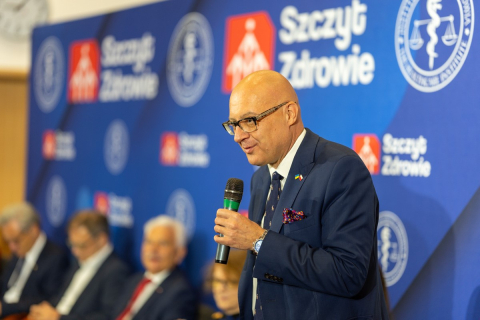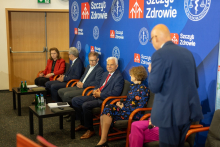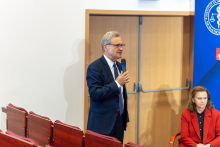The most urgent and pressing issue among the important topics mentioned at the conference was the mental condition of the people in Poland and the state of psychiatry in Poland.
– Last year, there were 1.3 million digital certificates for sick leave issued because of mental disorders and behavioral disorders in the Social Insurance Agency’s online system. It means 24 million days of absence at work – said professor Gertruda Uścińska, Head of the Social Insurance Agency (ZUS).
She also emphasized that mental disorders rank seventh among all causes for sick leave at the moment, representing 5.9% of all digital certificates and as much as 10% of all days of workers’ absence. It should be emphasized that leaves of absence certified by psychiatrists usually last 18-52 days or more. These certificates are issued to people aged 30 to 49. Which specific mental disorders are we dealing with? The ZUS registry of sick leave certificates indicates that these include: reaction to severe stress, adjustment disorders, depression episode, other anxiety disorders.
Depression problem on the rise
The latest data (June 2023) from the document entitled “Opinion of the Coalition on the implementation of a comprehensive care model for depression patients in Poland” indicates that depressive disorders are increasing in severity.
Prof. Mariusz Gujski, head of WUM Institute of Public Health and panel moderator, quoted the following data from the aforementioned document: – As regards psychoses, with schizophrenia on top of these, there are slightly above 380 thousand patients in Poland according to our estimations. We have 1.5 million patients with depression. Moreover, suicide attempts are among the important indicators of scale of depression. 145 hundred such attempts were recorded in 2022, which is almost 3 times more than a decade ago. Suicidal behaviors among children and teenagers are still another challenge. We have seen a huge increase in these cases during 2019-2021, by as much as 80 per cent. There were 1496 cases of attempted suicide among children and teenagers in 2021, of which 130 ended in death.
Causes for the dramatic growth
Why is the group of depression patients increasing? – The pandemic was certainly an important burden. Other relevant factors include lifestyle changes, increasing pace of everyday life, the pressure of the society’s expectations which keep growing for all of us. Finally, there are the changes in the functioning of family – said professor Marcin Wojnar, head of the Psychiatry Institute and Ward at WUM. – All this makes people with slightly poorer coping mechanisms more prone to develop depression.
It is most concerning that more and more children and young people are suffering from that disease.
– In their case, we are seeing an increasing incidence of various types of disorders, not only depressive ones, on one hand, and on the other hand we are aware of the inadequacy of the system – professor Wojnar said.
The estimated number of psychiatrists in Poland is slightly over 4.5k. There are 530 child and adolescent psychiatrists, of whom about 400 remain if we disregard those beyond retirement age. Not only do we have too few specialists but also an insufficient number of specialized treatment centers.
Proceeding with Treatment-Resistant Depression - advanced therapies
With treatment methods, the situation is better. Patients diagnosed with depression are prescribed anti-depressants from the selective serotonin reuptake inhibitor (SSRI) group. These work very well on 70 per cent of cases. Sometimes, however, there is no improvement.
– If the first treatment fails, we use a second medication for the right time, in the right dosage – professor Agata Szulc, head of the Department of Psychiatry ta WUM Faculty of Health Sciences, explains. – That second attempt is usually successful. If not, at this point we can diagnose a treatment-resistant depression, where there is no response to two correctly executed anti-depressant treatments - professor Szulc said.
Treatment-resistant depression patients take sick leaves more often, and these tend to be very long, for several months; they also receive rehabilitation benefits, and sometimes they permanently retire to receive a disability benefit. Is a drug-resistant depression even treatable?
– We use psychotherapy, which is extremely helpful. As far as pharmaceuticals are concerned, esketamine nasal spray has been registered since 2019 for use in treatment-resistant depression. This is a very interesting and highly efficient method – prof. Agata Szulc said. But we should bear in mind that it will not work in some patients.
What is going to turn for the better
Professor Piotr Gałecki, the national consultant in psychiatry, spoke about the ongoing changes in the psychological and psychiatric care system. – We have a pilot program of mental health centers for adults. There are slightly over 80 such centers in Poland at the moment. They cover 1/3 of the adult population. We are hoping that the number of centers will increase by the end of next year to cover half of the adult population. What does it mean in practical terms? Major shortening of waiting times for psychological first aid, fewer hospitalized patients and shorter hospital stays – the professor summarized.
A lot has been said in the public debate about the bad situation in child and adolescent psychiatry since the pandemic. The government reform is intended to change this. The primary goal is to make psychological aid more accessible, as close as possible to the patient’s place of residence. The changes are unwinding on three levels. The pending reform was discussed by Waldemar Kraska, Secretary of State at the Ministry of Health: – The first tier of the reform is community care. Even today, we have 398 community centers of psychological aid for children and adolescents. A patient can come there without a referral from a family doctor. The centers employ psychologists and therapists, who not only resolve an individual child’s issues but also family issues. The second tier of the child and adolescent psychiatric treatment system reform is a network of special centers where psychiatrists are employed. 133 such centers are operating at the moment. They offer outpatient care and daytime wards. Finally, tier three comprises 32 highest reference level centers offering 24/7 inpatient care.
More than psychiatry
The Health Summit took place on June 13 at the WUM Teaching Center and was streamed online. Professor Mariusz Gujski was the host and the event was officially opened by professor Zbigniew Gaciong, Rector of WUM. In addition to the debates on the people’s mental health in Poland, other interesting panels were held as well, specifically:
- No medical care system without people. How to support the medical professions at a time of human resources crisis.
- A gamechanger - what comes next? The availability of treatments that define progress in medicine.
- Oncology and hematology-oncology - from precise diagnostics to innovative therapies.
- Rarely occurring, often disregarded. The reality and forecast for patients with rare diseases.
- Management of health at the workplace in Poland.
In addition to those mentioned above, the Health Summit was attended by: prof. Bolesław Samoliński, kierownik Zakładu Profilaktyki Zagrożeń Środowiskowych, Alergologii i Immunologii UCK WUM; Urszula Szybowicz, założycielka Fundacji Nie Widać Po Mnie, dyrektor operacyjna Polskiej Federacji Szpitali; Piotr Bromber, podsekretarz stanu w ministerstwie zdrowia; prof. Ryszard Gellert, dyrektor Centrum Medycznego Kształcenia Podyplomowego; Łukasz Jankowski, prezes Naczelnej Rady Lekarskiej; Zofia Małas, prezes Naczelnej Rady Pielęgniarek i Położnych; Maciej Karaszewski, zastępca dyrektora Departamentu Świadczeń Opieki Zdrowotnej NFZ; Elżbieta Piotrowska-Rutkowska, prezes Naczelnej Rady Aptekarskiej; dr Bernard Waśko, dyrektor Narodowego Instytutu Zdrowia Publicznego PZH; Jakub Adamski, dyrektor Departamentu Współpracy w Biurze Rzecznika Praw Pacjenta; dr Jarosław Frąckowiak, prezes PEX PharmaSequence; Hubert Godziątkowski, prezes zarządu Polskiego Towarzystwa Chorób Atopowych; prof. Dariusz Jurkiewicz, kierownik Kliniki Otolaryngologii i Onkologii Laryngologicznej w Wojskowym Instytucie Medycznym-PIB w Warszawie, przewodniczący Zarządu Głównego Polskiego Towarzystwa Otorynolaryngologów Chirurgów Głowy i Szyi; Krzysztof Kopeć, prezes Polskiego Związku Pracodawców Przemysłu Farmaceutycznego - Krajowych Producentów Leków; prof. Maciej Kupczyk, prezes Polskiego Towarzystwa Alergologicznego; Tomasz Latos, przewodniczący sejmowej Komisji Zdrowia; prof. Beata Naumnik, kierownik I Kliniki Nefrologii i Transplantologii z Ośrodkiem Dializ, Uniwersytet Medyczny w Białymstoku; Mateusz Oczkowski, naczelnik Wydziału Refundacyjnego, Departament Polityki Lekowej i Farmacji w Ministerstwie Zdrowia; Anna Śliwińska, prezes Polskiego Stowarzyszenia Diabetyków; prof. Krzysztof Giannopoulos, kierownik Zakładu Hematoonkologii Doświadczalnej Uniwersytetu Medycznego w Lublinie; prof. Iwona Hus, prezes Polskiego Towarzystwa Hematologów i Transfuzjologów, kierownik Kliniki Hematologii Państwowego Instytutu Medycznego MSWiA; prof. Anna Latos-Bieleńska, przewodnicząca Rady ds. Chorób Rzadkich, konsultant krajowa w dziedzinie genetyki klinicznej; dr Andrzej Tysarowski, kierownik Zakładu Diagnostyki Genetycznej i Molekularnej Nowotworów Narodowego Instytutu Onkologii w Warszawie, koordynator ds. wytycznych diagnostyki genetycznej w ramach Narodowej Strategii Onkologicznej; Aleksandra Wilk, dyrektor Sekcji Raka Płuca, Fundacja TO SIĘ LECZY; Kamila Anna Dratkowicz, prezes Fundacji HypoGenek; Barbara Dziuk, przewodnicząca sejmowych podkomisji ds. onkologii i chorób rzadkich; dr Paweł Gonerko, kierownik Oddziału Pediatrii, Alergologii i Pulmonologii Szpitala „Zdroje” w Szczecinie; Stanisław Maćkowiak, prezes Federacji Pacjentów Polskich; Przemysław Marszałek, sekretarz MukoKoalicji, członek CF Europe i zarządu Fundacji MATIO; dr hab. Jolanta Sykut-Cegielska, prof. IMiD, kierownik Kliniki Wrodzonych Wad Metabolizmu i Pediatrii Instytutu Matki i Dziecka, konsultant krajowa w dziedzinie pediatrii metabolicznej; dr Roman Topór-Mądry, prezes Agencji Oceny Technologii Medycznych i Taryfikacji; dr hab. Grzegorz Juszczyk, Zakład Zdrowia Publicznego WUM; dr hab. Mateusz Jankowski, prof. Centrum Medycznego Kształcenia Podyplomowego; prof. Jarosław Pinkas, konsultant krajowy w dziedzinie zdrowia publicznego; Aleksander Roda, prezes TU ZDROWIE SA; dr hab. Piotr Wachowiak, prof. SGH, rektor Szkoły Głównej Handlowej.



